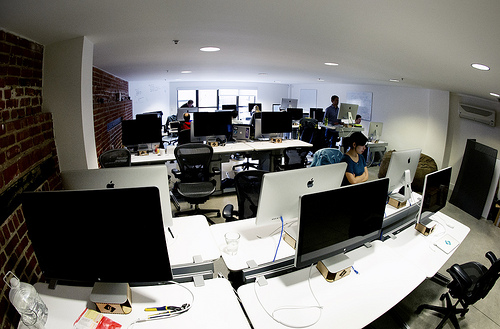Editor’s note: Jon Sterling has been in the real estate business since 2002. Follow him on Twitter @mistersterling.
The residential real estate bubble isn’t the only real estate challenge facing startups in Silicon Valley. Office space within the city limits is becoming more scarce by the day as tech companies continue their aggressive growth.
Relief is on the way, but it isn’t an instant solution. The San Francisco Giants announced a $1.6 billion plan last week that would add 1000 rental units and 1.7 million feet of office space in the 27 acres that is currently being used as their parking lot. That’s wonderful, but construction won’t begin until 2015 and the estimated completion date is 2021.
Most of the large-scale new construction projects are happening in Mission Bay. There are only a few physical spaces where large office projects could be built in San Francisco without displacing something else, and they sell for a premium. Many of those lots are located in Mission Bay, Dogpatch, and the Central Waterfront. New construction will ease the pressure, but it’s not going to happen fast enough to satisfy the current demand.
Because the city is surrounded by water on three sides and the citizens are very protective of their open spaces, new development will likely require the “Manhattanization” of the city. New construction will go upward instead of outward, and the density will increase. New high-rise office buildings are a good solution to the city’s growing needs, but they won’t be built fast enough to help with the current shortage of space. The result? Higher prices for everyone for the short-term.
What about the piers? The aging piers along the waterfront are largely under-utilized and could alleviate some pain if they were made available to companies who need space. Last fall, the tenants at Pier 38 (Automattic, Dogpatch Labs, and True Ventures, among others) were evicted when the Port of San Francisco deemed the property unsafe and issued a condemnation order. The piers are ideal candidates for redevelopment efforts, and the America’s Cup deal is a step in the right direction. Some ambitious action from those who occupy powerful political offices (hint, hint) would help the entire startup ecosystem.
Companies looking for space on the Peninsula are having a tough time as well. For example, tech startups in downtown Mountain View are being forced into storefront retail space because of the lack of inventory. Retail space is much more expensive than traditional office space. If a company has to spend an exorbitant amount of money on office space, that eats away at the amount of money they can use to hire talented employees.
Good news! The “sharing economy” is helping create some efficiency in the market. The movement still isn’t a large enough part of the market to be significant, but it’s gaining traction. The explosion of shared office environments, like LiquidSpace and Loose Cubes is helping with the short-term crunch, and it remains to be seen whether or not they will be long-term players.
If you’re in the market for space, find a commercial leasing agent who works in the areas that interest you. Commercial real estate is a different monster than residential real estate, and many of the available spaces won’t be advertised online. Walk the area and call any agents you find with “For Lease” signs posted. Those are the agents who will know about office space that’s not being advertised and space that will available soon. Make friends with those agents.
Consider short-term or temporary space if you can’t find a suitable location. Start by checking with the companies who are in the news for signing big leases. They won’t fill all of their new space from day one, and may be interested in sub-leasing some of it. Places like Rocketspace and NextSpace are good short-term solutions if they have enough space for you.
And if you get desperate, you can go with the “rent a mansion” solution.
There is no magic bullet or perfect solution for the commercial real estate situation in Silicon Valley. Like any market, real estate fluctuates based on supply and demand. Like any market, the early movers win. So get moving.
[image of Getaround office via flickr/Getaround.]
